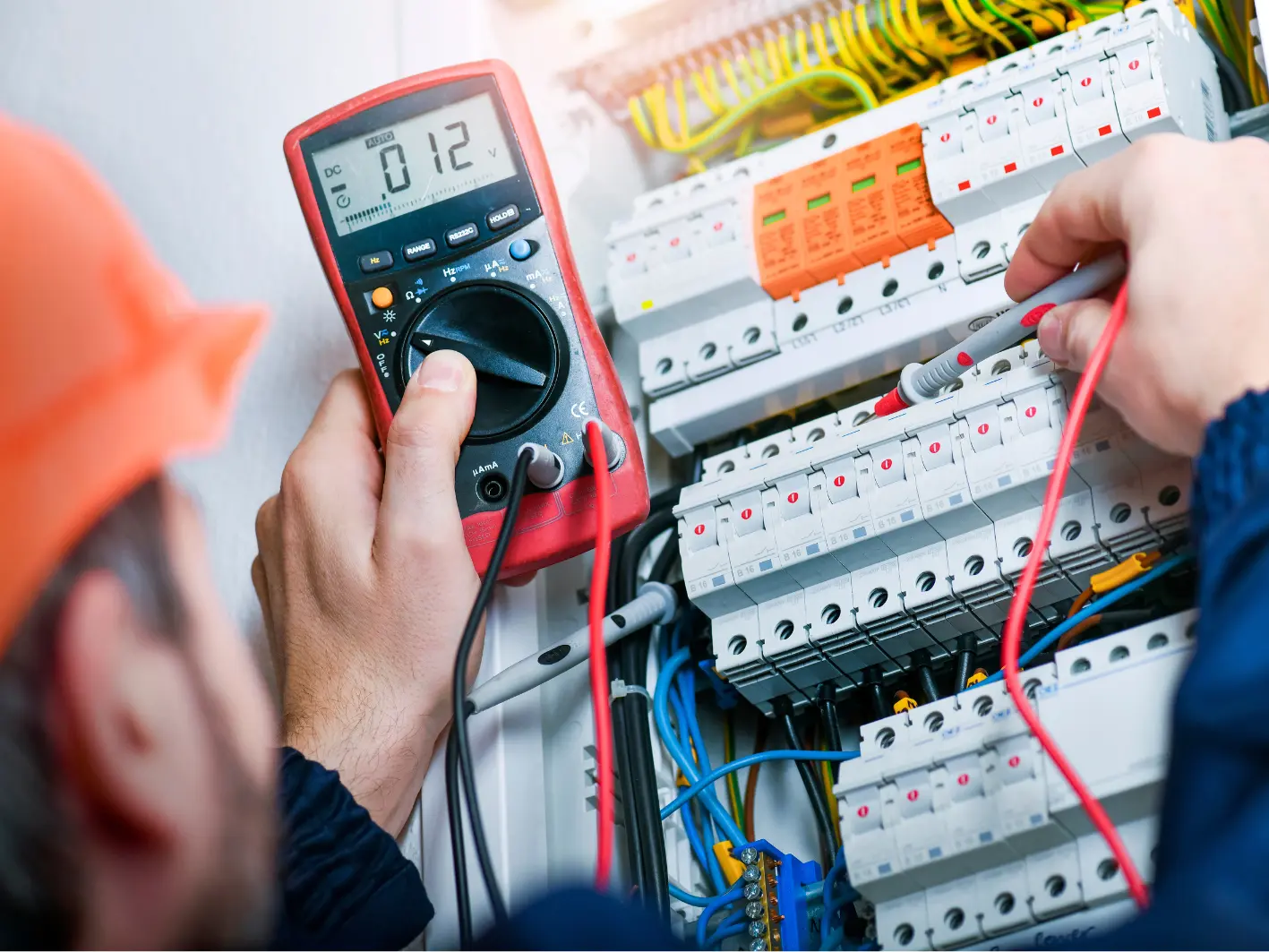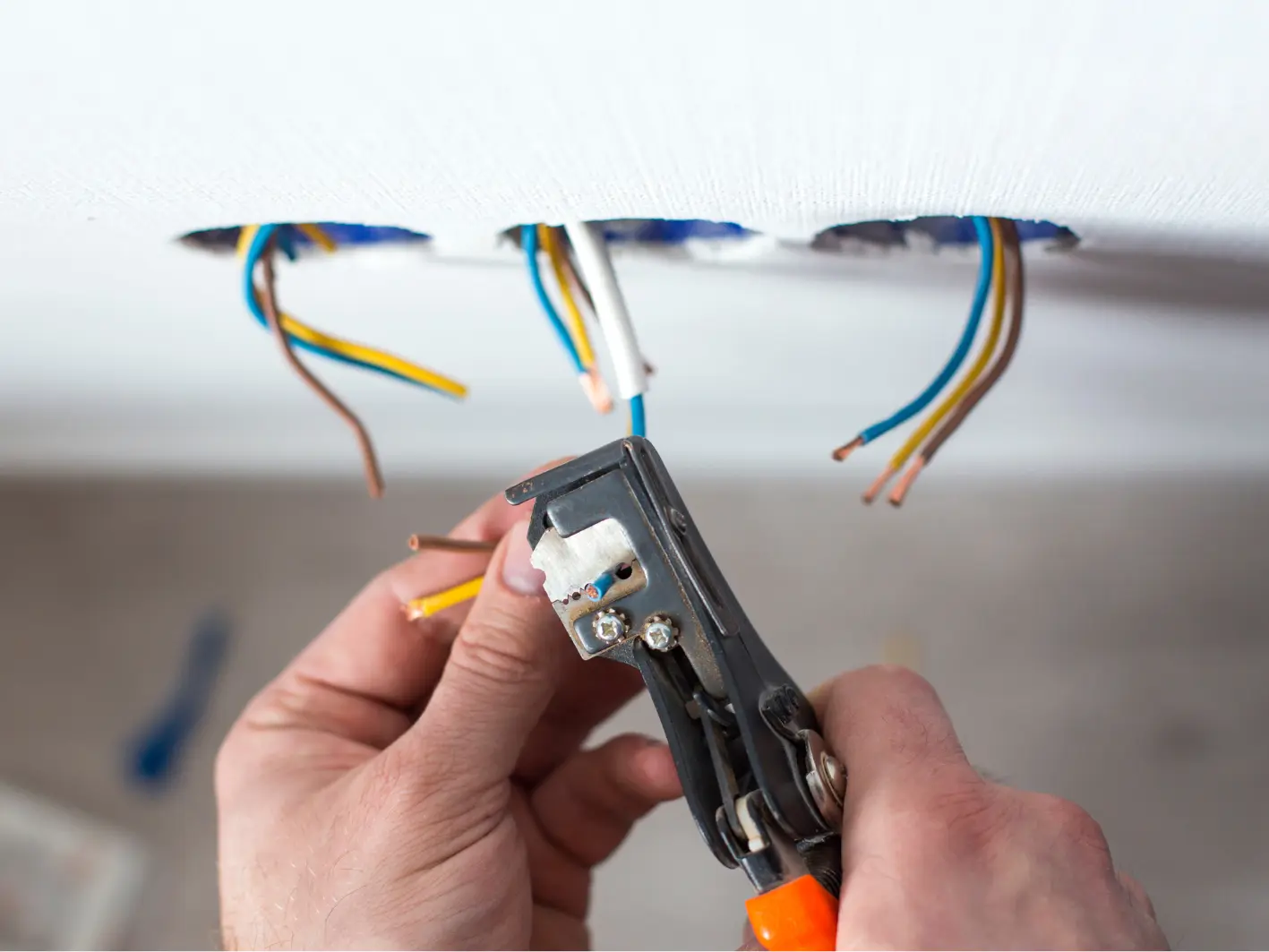Finding the right local electrician near you
Whether your home needs rewiring or you have an electrical emergency, there will be times when you need an electrician to come and save the day. Here’s everything you need to know about hiring an electrician, including how much you’ll pay and how to find the right one.
When should I hire an electrician?
There are plenty of times you’ll need to call an electrician throughout your time renting or owning a home. The better informed you are about tasks and costs, the better you’ll be at choosing the right professional.
Some of the most common electrical jobs include installing a new power point, rewiring a home, electrical repairs, lighting, and upgrading your switchboard. Whether you need something electrical installed or replaced or have an electrical emergency, you should call an electrician.
Image credit Melville Electrical
While it can be tempting to carry out electrical work by yourself, we wouldn’t recommend it. Not only are you risking an electric shock (ouch!), but shabby electrical work will cost you more to fix later.
If you have an electrical need or issue but are not sure if it’s something an electrician can help with, contact one in your local area and discuss the issue with them. If it’s something they can do, they’ll let you know and quote you for the work.
Emergency electrical jobs
Some electrical jobs, such as re-wiring are pre-planned. Others are unforeseeable. You’ll require an emergency electrical professional in the event of an unplanned electrical emergency. Common electrical emergencies include electrical fires, power outages, short circuits, tripping circuit breakers, and malfunctioning power outlets.
When you need an electrician
It can be difficult for many homeowners to know exactly the right moment to hire an electrician, especially if you’re reluctant to part with your hard-earned cash unnecessarily. Look out for the following signs that you require a sparky’s services urgently:
- Electric shocks from plugs
- Overheating plugs
- Burning on switches or plugs
- Burning smell from electrical appliances
- Wiring 30+ years old
- Damaged or singed wires
- Flickering lights
- Power outage affecting only your property
- Power points are not working
- Circuit regularly tripping
How much does an electrician cost?
Image credit Canny Electrics
Electricians usually charge hourly, and you can expect to pay between $75 and $130 per hour for an electrician in Australia. Naturally, this cost varies depending on factors such as your home address, what type of work you require, and whether or not it’s emergency work - the more last-minute the request, the more you can expect to pay. This is because you’ll also tend to pay a higher call-out fee.
As well as an hourly rate, most electricians charge a one-off call-out fee to cover their costs - this is often higher if the job is last minute. These call-out fees range from $50 to $150. If the task at home takes under 30 minutes, such as installing a new power point, the electrician might just charge you the call-out fee without the hourly rate since most call-out fees include around half an hour of labour time.
If you live in a state with a higher cost of living, electrician fees will tend to be more expensive, too. To work out how much you can expect to pay depending on where you live, here’s a breakdown of each state and the typical cost per hour of an electrician.
| State | Average Hourly Rate ($) |
|---|---|
| Australia Capital Territory | $92.75 |
| New South Wales | $103.75 |
| Queensland | $99.00 |
| South Australia | $93.50 |
| Western Australia | $95.00 |
| Victoria | $104.50 |
Likewise, you can expect to pay more in expensive cities such as Sydney and Melbourne. Rural areas tend to cost less, but you might find it more difficult to find an electrician. An easy way to locate a reliable electrician near you is to use a comparison site to gather quotes from local professionals.
While you won’t necessarily know how much each electrical task will cost until you know how long it takes them, there’s a ballpark figure for the most common tasks, as laid out in the table below. The prices reflect the cost of the task overall, not the cost per hour.
| Electrician Task | Average Electrician Cost |
|---|---|
| New power point installation | $50-$150 |
| Rewriting a property | $1000-$12,000 |
| Installing a light | $50-$85 per light |
| Installing a home automation system | $15,000-$25,000 |
| Installing a new switchboard | $500-$1200 |
| Installing a ceiling fan | $250 |
| Installing an air conditioning unit (including the cost of the unit) | $5000+ |
What are the most common electrician services?
Image credit Whitelock Electrical
Here’s a list of the most commonly performed services by electricians. Electrical troubleshooting makes up the bulk of an electrician’s time, but apart from solving problems, you can call up a sparky for one of the following jobs.
Rewiring a property. Have your property rewired by a reliable sparky around every 30 years. They’ll bring all the wiring in your property up to date, and while it can be pricey, it’s definitely not a DIY-friendly job!
New power point and lights. By installing additional power outlets you can make it easier to charge your electronic gadgets, so you won’t have to reach behind the couch anymore to plug in your phone. Likewise, new lighting makes your whole space feel brand new - think of it as giving your space a facelift but for a fraction of the price.
Upgrading switchboard systems. An electrician can upgrade your switchboard to allow it to handle increased power demands, which is especially useful if you’re installing new power points or electronic devices.
Ceiling fan or air conditioning unit. Living through Aussie summers is no easy feat! Your ultimate survival guide for an Aussie summer will no doubt involve A/C, and a trusted sparky is the best person for the job.
Installing or repairing CCTV systems. Sparkies, especially ones that deal with commercial buildings, spend much of their time installing or repairing security systems for buildings like offices, hotels, and retail stores.
How long do electrical services take?
The length of time it takes for an electrician to complete a task varies depending on the task at hand.
If getting the job done quickly is important to you, chat with your service provider of choice for a breakdown of expected timelines. Typically, something like a power point installation can be done in the time it takes to drink a cup of coffee, but a whole property rewiring might last for weeks if your home is especially large.
Most electricians can tell you how long they usually allocate to a given task so you can figure out approximately how long it will take until the job is done. If there’s an issue you need fixing urgently, call an emergency electrician.
Bear in mind that many electricians charge by the hour, so if you’re on a tight budget, reduce how long they’ll spend on a task by clearing the area in advance of their arrival.
Are all electricians the same?
Image credit 3D Energy
There are actually various types of electricians depending on the job - we’ll take a look at the most common types. Naturally, some electricians will cover all four of these categories, but some specialise in just one. For example, some electricians don’t specialise in emergency call-outs, but may have an emergency number you can call for last-minute urgent issues.
Residential vs commercial electrician
A residential electrician deals with electrical issues in the home as the name suggests. A commercial electrician deals mainly with the electrical systems of commercial buildings, such as office blocks, hotels, and retail spaces. Since commercial buildings are especially concerned with public safety, a commercial electrician will often need extra qualifications.
Typical tasks carried out by a commercial electrician include installing and upgrading CCTV/security systems, electrical wiring for commercial spaces, installing large cooling and heating systems, and electronic key systems.
Since brands and large corporations mainly work with commercial electricians, they might be more inclined to hire a well-known electrical company than a sole trader.
Specialist electrician
Usually, electricians are generalists - however, some have chosen to focus on specific branches of electric work or more complex projects. When you encounter a rather difficult problem or a more complicated installation, looking for an electrician who specialises in a certain field can be useful.
In common practice, these include knowledge areas as solar panels, air conditioning, automation, refrigeration, lighting, and switchboards. Specialist electricians may be employed in both residential and commercial sectors depending on the specialisation.
Emergency electrician
An emergency electrician specialises in emergency call-outs for situations like electrical fires, faulty electrical wiring, or power outages. These emergency situations can occur in both residential and commercial properties.
Since electrical emergencies can happen at any time, emergency electricians usually offer a 24/7 call-out service, with a phone number you can call even in the middle of the night. This is useful for homeowners, renters, and landlords alike.
If you can smell burning coming from power sockets, have an outage that seems limited to just your property, or your smoke alarm is failing, you’ll benefit from the services of an emergency electrician.
Finding a sparky you can trust
Image credit Approved Electrix
The two most reliable ways to find a reputable electrician are word of mouth - yes, we mean us, too! Word of mouth from friends and family can help you find a reliable professional in your area, and we do the same thing, but with thousands of reviewers providing that all-important seal of approval.
When searching for an electrician, compare quotes you receive online to the approximate prices laid out in our articles to check you’re getting bang for your buck.
Don’t trust estimates that are too low - while it might sound like you’re getting a good deal, the work will probably be carried out poorly, leaving you with the added costs of fixing it later down the line.
Once you’ve gathered quotes, reviews and testimonials are the easiest way to vet a potential electrician and check they’re worth the money.
Should my electrician be licensed?
All electricians who work in a company or as a sole trader must hold an electrical license. Unlicensed electricians can be downright dangerous for your home, so don’t be afraid to ask for proof of a license before working with your professional of choice. Plus, it’s illegal to carry out professional electrical work in Australia without the right license.
Questions to ask an electrician
- Are you a licensed electrician, and can I see evidence of your license?
- Do you have valid insurance?
- Can you show me references or examples of your previous work?
- Is your work guaranteed?
- How long will my job take?
- What are your terms of payment?
- What are your terms of payment?
- Which contractor will be doing the work?
Get three quotes from local electricians today
Here at Word of Mouth, we can connect you with trusted local electricians in your area. Find electricians in Sydney, Melbourne, Brisbane, and more with our extensive database of reputable professionals offering excellent value for money.
Electrician
Find the best electrician in your area
-
Sydney Electrician
Sydney - Newcastle - Wollongong - Penrith - Blacktown - Parramatta - Campbelltown - Liverpool
-
Melbourne Electrician
Melbourne - Geelong - Werribee - Point Cook - Frankston - Pakenham - Cranbourne - Berwick
-
Brisbane Electrician
Brisbane - Ipswich - Cairns - North Lakes - Townsville - Redcliffe - Toowoomba - Caboolture
-
Adelaide Electrician
Adelaide - Mount Barker - Gawler - Morphett Vale - Salisbury - Glenelg - Mawson Lakes - Port Adelaide
-
Perth Electrician
Perth - Mandurah - Rockingham - Joondalup - Fremantle - Canning Vale - Bunbury - Midland
-
Hobart Electrician
Hobart - Launceston - Kingston - Glenorchy - Sorell - Sandy Bay - Moonah - Howrah
-
Canberra Electrician
Canberra - Belconnen - Gungahlin - Fyshwick - Belconnen - Kambah - Phillip - Kingston
Other Building & Trades Businesses
- Air Conditioning and Heating
- Artificial Grass
- Asbestos Removal
- Awnings
- Bathroom Renovations
- Blinds
- Bricklayer
- Builders
- Building Designer
- Carpenter
- Cladding
- Concreter
- Decking
- Demolition and Excavation
- Doors
- Electrical Wholesalers
- Electrician
- Excavator
- Fencing
- Flooring
- Garage Doors
- Gas-fitter
- Gates
- Gazebo
- Glazier
- Hardware Store
- High Pressure Cleaning
- Home Automation
- Insulation
- Interior Designer
- Kitchen Renovation
- Landscaping
- Lawnmower
- Lighting
- Painters
- Paving
- Pergola
- Plasterer
- Plumber
- Pools
- Rendering
- Roller Shutters
- Roofing and Guttering
- Rubbish Removal
- Scaffolding
- Security Doors
- Sheds and Garages
- Shop Fitting
- Solar Panel Installer
- Stonemason
- Structural Engineer
- Surveyor
- Tiling
- Truck Rental
- Wallpapering
- Waterproofing
- Welding
Find the Right Price for Your Job
Browse our comprehensive cost guides to find the average national price for your job.

How Much Does An Electrician Cost?
Average cost from $80 to $130 per hour

What's the Cost to Install a Ceiling Fan?
Average cost between $100 and $600

How Much Does It Cost to Rewire a Property?
Average cost from $3800 to $7200